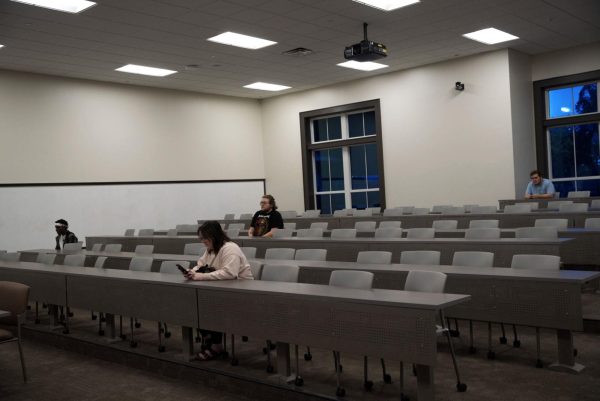I gasped for breath and placed one hand on my chest, whispering to myself that everything would be okay. My other hand kept fumbling to stop the alarm — my fingers slipping over my phone screen. As much as I wanted to get to the class where attendance was 10% of the grade, the heavy bulldozer of anxiety pinned me back to bed. When balancing my personal, social, academic and work life felt impossible, the last thing I wanted was to chase down paperwork just to prove that I was not capable of being in class.
What I labelled as a personal experience is more common than I thought. In a study done by the Lumina Foundation, in response to the question “How often do you experience emotional stress while in college?,” 40% of students said frequently, 46% said occasionally, 13% said rarely and only 2% said never.
Usually, I love going to my classes, as I find learning exciting. But, on some rare occasions, my mental health gets carried away by my thoughts. Some days, I push through my gut feeling and get my body present in class, but my mind often still wanders. I am not learning anything in this state. I am creating more problems as I am unable to focus on the lecture and unable to address my feelings.
Back in high school, I truly did not understand what “mental health” meant until the COVID-19 pandemic. I do not blame anyone around me for keeping me ignorant on the topic, as it was not widely discussed before. Sometimes, it was looked down upon as taboo or even as a sign of weakness. I do not understand why mental health is not treated to the same standards as physical health.
My wake-up call came when I read about Simone Biles, the Olympic gymnast who withdrew from the all-around final in Tokyo in July 2021 due to her struggle with her mental health. At first, her decision did not align with what I had learned about sportsmanship. Stepping back was not something I was taught represented strength. But over time, I began to see it differently, as it takes courage to stand for yourself when you know it is not the right time. It is a kind of courage that college students need just as much.
Learning to reach out is what helped me realize when I needed a break. Like many students, I used to skim the syllabus to see what counted as a “valid excuse.” On the really hard days, I would skip class altogether, letting my grade take a hit rather than trying to explain what I was going through.

The more I opened up to professors, the more I realized they care. Many will listen. Many will understand. Some will even invite you to talk if you need support. Almost all of them just want to know why you are missing class; they are not trying to penalize you, they just want you to stay on track.
One of the kindest and most memorable responses I have ever received from a professor came from Christie Lawrence, a communication professor who has 15 years of experience in behavioral health. I emailed her on a particularly hard day, letting her know I was feeling anxious and would not be able to attend her class. I did not expect much, I just wanted to be honest with her. But her response was filled with warmth and understanding. She recommended going on a walk and even invited me to play with her dog and horses.
In an additional email Lawrence shared with me, she addressed three pieces of advice for students who are having a hard time. First, talk about your issues. Whether it is to a professional or a trusted friend — or even just journaling — let it out. Her second piece of advice is one we often hear, but just as often ignore: get up and move. Physical activity, even something as simple as walking, can make you feel better. Lastly, she emphasizes this above all: suicidal statements are serious. She urges everyone to always treat a suicidal statement about harming oneself as real.
When talking to Lawrence in person, she gave me one piece of advice that stuck with me.
“If you have a friend, and they are isolating or you have not seen them, then as a friend, you have a responsibility to go physically to their apartment,” Lawrence said. “Don’t text.”
College life can be overwhelming sometimes. While it might feel that you are expected to power through everything, burnout is real. Taking a mental health break does not make you lazy or irresponsible — it makes you human. Professors are not mind readers, and many are more understanding than we realize. If you are struggling, let them know.
Listen to your mind and protect your peace. Do not be afraid to ask for that excused absence. Afterwards, come back stronger — just like Simone Biles reclaimed her space and reminded us all in the 2024 Paris Olympics: you do not have to push through everything, and it is okay to take some time for yourself. Sometimes, the best move forward is a step back.












Suruchi Dhakal • Apr 16, 2025 at 12:43 pm
Oh my god , such an inspiring and motivating story samata. Keep going
Utsav • Apr 16, 2025 at 9:20 am
Such a heartwarming writing, keep it up samata